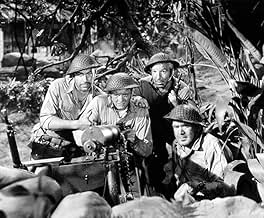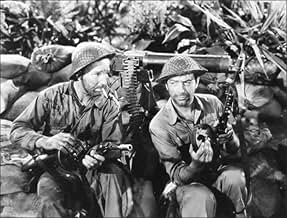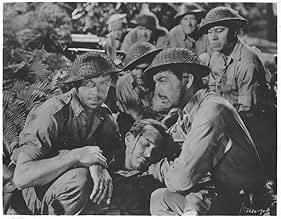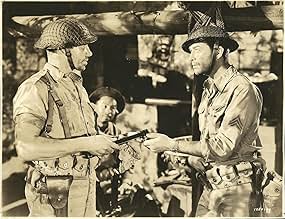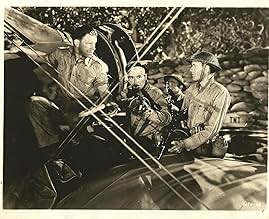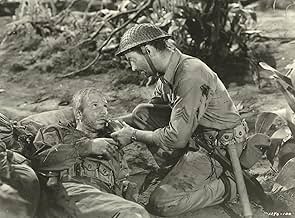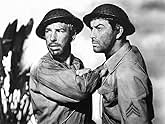Füge eine Handlung in deiner Sprache hinzuIn 1942, in the Bataan peninsula of the Philippines, a ragtag American unit commanded by Sergeant Bill Dane attempts to blow-up a bridge in order to slow the Japanese advance.In 1942, in the Bataan peninsula of the Philippines, a ragtag American unit commanded by Sergeant Bill Dane attempts to blow-up a bridge in order to slow the Japanese advance.In 1942, in the Bataan peninsula of the Philippines, a ragtag American unit commanded by Sergeant Bill Dane attempts to blow-up a bridge in order to slow the Japanese advance.
- Regie
- Drehbuch
- Hauptbesetzung
- Auszeichnungen
- 5 wins total
- Yankee Salazar
- (as J. Alex Havier)
- Wounded Soldier
- (Nicht genannt)
- Japanese Soldier
- (Nicht genannt)
- Japanese Soldier
- (Nicht genannt)
- Infantry Soldier
- (Nicht genannt)
Empfohlene Bewertungen
After the Japanese invasion of the Philippines in December 1941 and the fall of Manila (January 2, 1942), the defending Americans and Filipinos withdrew to Bataan, foiling Japanese efforts to split the forces of U.S. General Douglas MacArthur... His troops fought a fierce delaying action until April 9, 1942, and remnants, led by Lieut. Gen. Jonathan M.Wainwright, escaped to Corregidor Island, where they surrendered about a month later...
On January 9, 1945, U.S. Forces, under MacArthur, landed at Lingayen Gulf to the north and sealed off the Bataan Peninsula... Landings were then made at Mariveles Harbor in the south and on Corregidor Island, thus securing Manila Bay for the U.S. Navy...
"Bataan" is the fictional story of 13 men who stayed behind, holding a bridge, and fighting to the death a rear guard action to ensure the success of the Allied forces retreat from the Philippines...
The audience live with the soldiers their last heroic days: George Murphy, an Air Force Lieutenant secretly reliable; Lloyd Nolan, the smart Corporal with compassionate qualities; Thomas Mitchell, a career NCO; Deni Arnaz, a friendly Spanish soldier; Barry Nelson, the competent Matowski; Lee Bowman, the Captain who falls with a bullet; Robert Walker (in his screen debut) who almost breaks down from homesickness; Kenneth Spencer, the black soldier with an undisturbed force and simple dignity, and Robert Taylor, the tough heroic Sergeant alive in the face of the enemy, who sets up his machine gun and keeps it firing until the end...
All are representatives of the heroism existing in all Americans, symbol of the heroic resistance...
At least half of the story is not action but melodramatic looks at the soldiers, particularly of the squad's sergeant leader Robert Taylor and one of his men who has an attitude problem: Lloyd Nolan. We also get some shorter profiles of combat men played by Robert Walker, Thomas Mitchell and Desi Arnez (yes, Lucy's husband).
The special effects are more than passable considering they weren't too advanced in the film industry compared to today's technology. However, credibility was a little thin as those Japanese soldiers died awfully fast in those combat scenes at the end. I swear I saw several of them drop over before anyone hit them!
Taylor was the best in this movie "army" and Walker was the annoying character, playing an extremely young and generally stupid Navy guy (don't ask) who never stopped talking in this irritating voice. Other than his character, this was a tough, no-nonsense war movie.
The jungle setting (although filmed on the studio lot) is impressive with its exotic foliage and adds to the realism. The hand to hand combat scenes are well staged, as are the final moments of the film.
All in all, a gripping war film that more than holds its own with contemporary stories like SAVING PRIVATE RYAN.
Has to be appreciated in the context of its time--when flag-waving patriotism was at its peak and lines like "Those dirty Japs" were not considered politically incorrect.
Yes, you can say some of the soldiers are clichéd, but death is shown unflinchingly. Combat is portrayed as a bloody, messy, fatigue-inducing business. Boredom and endless waiting take their toll on nerves as well. The banter and cocky talk is whistling past the graveyard.
Lloyd Nolan's character is rough and unlikeable. He fights for freedom, but he fights dirty and he doesn't pretty things up with patriotic speeches. Some might complain about the black soldier playing harmonica and taking orders from white men. Actually, for the time, he was portrayed with dignity and shown to be as brave as any of the other soldiers. As for Robert Taylor, his weariness and resolve at the end are stirring and the last scene is not one you will soon forget.
Ignoring the propaganda aspects of the movie, the last half works as almost a pure horror movie, as our cast gets gruesomely picked off by unseen foes lurking in the jungle.
Exciting and gripping, it's easy to overlook the faults of this most violent and gritty of WW2 films made at the time.
"Bushido, Bushwa! You stink!" So died the heroes of Bataan...
Wusstest du schon
- WissenswertesPrologue: "When Japan struck, our desperate need was time--time to Marshall our new armies. Ninety-six priceless days were bought for us--with their lives--by the defenders of Bataan, the Philippine army which formed the bulk of MacArthur's infantry fighting shoulder to shoulder with Americans. To those immortal dead, who heroically stayed stayed the wave of barbaric conquest, this picture is reverently dedicated."
- PatzerAlthough the American soldier was clearly a great coconut tree climber, it is near to impossible to sit atop a coconut tree. Many Filipinos to this day fall when attempting this.
- Zitate
Sergeant Bill Dane: Come on, suckers! What's the matter with you? What are you waitin' for? Didn't think we were here, did you? You dirty rotten rats! We're still here! We'll always be here! Why don't you come and get it?
- Crazy CreditsClosing credits epilogue: So fought the heroes of Bataan. Their sacrifice made possible our victories in the Coral and Bismark Seas, at Midway, on New Guinea and Guadalcanal. Their spirit will lead us back to Bataan!
- Alternative VersionenAlso available in a computer colorized version.
- VerbindungenFeatured in Toast of the Town: A Salute to Lucy and Desi (1954)
- SoundtracksSt. Louis Blues
(1914) (uncredited)
Music and Lyrics by W.C. Handy
Sung a cappella and hummed often by Kenneth Spencer
Top-Auswahl
- How long is Bataan?Powered by Alexa
Details
Box Office
- Budget
- 958.000 $ (geschätzt)
- Laufzeit1 Stunde 54 Minuten
- Farbe
- Seitenverhältnis
- 1.37 : 1


